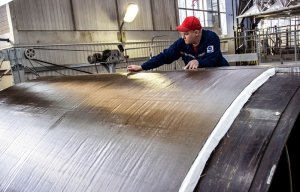
Russia poised for rapid growth
The news has been welcomed by many producers, who consider the Russian market as one of the most promising for their further development.

7th August 2019
Innovation in Textiles
|
Moscow
 The Russian technical textiles industry may receive an additional impetus for growth this year, thanks to the recently announced government plans to ease the existing restrictions on global producers taking part in public tenders for the purchase of innovative textile products for state needs.
The Russian technical textiles industry may receive an additional impetus for growth this year, thanks to the recently announced government plans to ease the existing restrictions on global producers taking part in public tenders for the purchase of innovative textile products for state needs.
These plans have been recently confirmed by Russia’s Deputy Prime Minister Dmitry Kozak, responsible for the development of the technical textiles sector. According to Mr Kozak, he has already instructed the national government to create conditions for the better access of foreign producers of innovative textile products on public procurements in Russia.
The news has been welcomed by many producers, who consider the Russian market as one of the most promising for their further development.
Federico Pallini, General Manager Global Division Building Materials at Freudenberg Performance Materials, said in an exclusive interview to Innovation in Textiles that the company’s biggest hopes in Russia are put in the further expansion in the high-performance technical textiles segment, designed for the use in construction and roofing industry. According to local analysts, participation in state tenders in the Russian market could be of interest to Freudenberg, as it may provide additional opportunities for growth.
“We believe the forecast is positive overall, expecting a growth to a mid-term. The main drivers are to be identified in the many projects aimed at the modernization and expansion of the country's infrastructures,” commented Mr Pallini.
Currently, the segment of public procurements remains the largest in the entire Russian textiles industry in value terms, with the annual value of purchases being estimated at around US$ 3 billion.
It is anticipated that the ban on the purchases of imported technical textile products will only remain in place for a limited categories of technical textile products supplied for the defence sector.
The majority of Russian technical textile manufacturers and industry’s analysts believe the more active expansion of foreign producers into the domestic market may contribute to a tougher competition, especially considering that in recent years the quality of domestic produce has improved significantly.
Alexey Chichkin, a senior analyst in the field of innovative textiles, of the Russian Union of Textile and Light Industry Producers (Soyzlegprom), told Innovation in Textiles that while the share of domestic producers in the local market has increased significantly in recent years, there is a possibility that the current balance in the market may change shortly, as many global textiles producers will try to restore their lost market positions.
According to experts of Soyzlegprom, at present, the biggest opportunities for growth for foreigner manufacturers may be associated with the segment of geotextiles, composites and other related products, which are primarily used in road building.
This is due to the implementation of the national road building project Safe and quality roads, which will run for the next several years, contributing to the growing demand for geotextiles.
As for domestic producers, one of the options for them may be increasing their exports into foreign markets, particularly Western. In the meantime, Alexey Chichkin believes, despite the existing stable demand for innovative textile products in Russia at present, many of local producers may face with tough times this year already, due to the lack of the much-needed state support.
Instead of introducing new ways of support, the local government decided to extend the already existing support programme for the Russian smart textiles industry by adopting a state decree, which facilitates technical re-equipment of enterprises of the industry. This involves the provision of certain subsidies, which are only provided to the companies deemed significant, which includes only a few leading domestic producers. In contrast, most of the other industry’s enterprises do not have access to any state support.

Business intelligence for the fibre, textiles and apparel industries: technologies, innovations, markets, investments, trade policy, sourcing, strategy...
Find out more